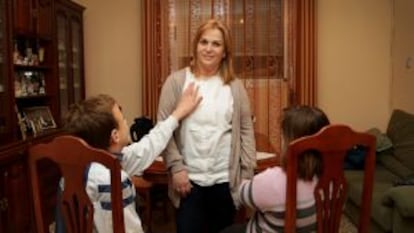Is care for dependents going private?
The government is opting to offer 'service checks,' which could lead to a dual system for rich and poor

Privatization. The word keeps cropping up in heated debates, on protest signs and during street demonstrations. Now privatization has reached the system of care for dependents in Spain. And while it may not have made the same waves in the media as the healthcare privatization debate, many people are warning about the gradual invalidation of a system that was born as a public, universal service.
The Personal Autonomy Promotion and Care for People in Situations of Dependence and their Families Act - better known as the dependents law - was enacted in November 2006. Created just before the property crash and the ensuing economic crisis, it was another of the ambitious social reforms pushed through by Socialist Prime Minister Jos¨¦ Luis Rodr¨ªguez Zapatero at a time when money was no object. The law was simply a stepping stone for what would one day become the National System of Care for Dependents, a public agency to assist the elderly and people with disabilities.
But then the crisis hit, and the cost-cutting began, and some members of the current conservative government began making statements that set alarms bells ringing in dependent care sectors. A few months ago, for instance, the state secretary for social services, Juan Manuel Moreno of the Popular Party (PP), told the Efe news agency that "we want to reroute much of this activity toward the private sector because it's the sensible thing to do; there are lots of businesses in this line of work, it's a mature sector that does a great job."
In his words, it was all about making the system "sustainable."
The private sector has always been highly active in this field. Senior residences, daycare centers and home care are all offered by private companies, even if the services are paid for by the state and the recipients of the aid. There is not much to object to, since hardly anyone denies that this private-public partnership works.
Senior residences, daycare and home care are all offered by private companies
The law established that home care by relatives would only be paid for in exceptional cases, when professional services were not available. But in the few years since the system has been in place (beginning in 2007), the state has awarded more checks for family caregivers than for outside services. The PP government has decided to turn this situation around, but the opposition claims that the results are far from satisfactory.
"What they're offering us now is a 'service check,' and everyone knows what that means: they're privatizing the system," says Esther D¨ªaz, the social welfare commissioner for the region of Asturias.
The service check, which the state has repeatedly tried to introduce into the school system, is a sum of money that is given to parents so they can choose the school they want for their kids. Critics contend that things are exactly the other way around: it is the school that ends up selecting the parents and students it wants.
In the dependents care system, this would amount to a check extended to dependent individuals so they could pay for a daycare center, a room in a senior residence or a professional caregiver. Only Extremadura, Castilla y Le¨®n and Arag¨®n award such checks in significant amounts.
"Asturias made a huge effort to open public residences and daycare centers, so we have the offer; but emphasizing this type of aid [the service check] will make people turn to private centers where there is no public offer. Yet the check is not enough to pay for a private center, so those who can afford to put up the rest of the money out of their own pocket will do so, and those who can't will have to live on charity," says Esther D¨ªaz.
They're offering a 'service check,' which means privatizing the system"
Experts see two main problems with the service check: the first is the creation of a dual system where people with means will be welcome at senior homes with all sorts of perks (hairdresser, physiotherapy, and so on) while the public centers will be left for people who have nothing to add to the check (which is typically made out for 500 to 700 euros). To put it bluntly, private centers will be for the rich and the public centers will be for the poor.
In order to calculate the user's share of co-payment, the system only takes into account the dependent person's income and assets. But if instead of assigning dependents a room in a residence, the state hands them a check where that co-payment is already taken into account, then relatives of the dependent person may be forced to contribute some of their own money (if they can) to pay for the residence.
"Twenty euros? I'd rather they didn't bother"

Carmen Ca?avete and Paco Cubells have two children, both of whom have severe disabilities. When Carmen was 29 she gave birth to Paula, who has Down syndrome. Fifteen months later came Fran. Both of them require constant assistance. Paula, who will be 16 next month, did not speak until the age of five. Fran, who is nearly 14, still does not talk.
Their mother takes care of both of them. As a non-professional caregiver, she used to receive 807 euros a month (480 for Paula, 327 for Fran) under the dependents law.
But following successive cuts to this type of aid, the last check that this family from Torrent, Valencia received from the regional government was for a grand total of 40 euros. That is to say, their subsidy has been reduced by 95 percent. Carmen is indignant.
"You feel rage, helplessness...," she says. "Are they trying to justify the fact they are helping me, with 20 euros? I'd rather they didn't pay me anything at all - that way I won't give them the pleasure of claiming they're supporting me. I'll handle it all by myself."
The government of Valencia has begun implementing a measure that introduces (in reality, increases) co-payment for recipients of dependent aid. It is a state-wide measure that regions have until June to make effective. The Valencian government has been one of the first to do so, and began cutting back the subsidy in the November check (payments are coming two months late).
Six other regional governments are following in Valencia's footsteps, but none as restrictively as here, say sources in the sector.
Co-payment is just the latest bad news for aid recipients, after two other cuts to their subsidies. The first was the state's decision to stop paying social security for caregivers (160 euros a month). The second was a 15-percent reduction in aid amounts, applicable since August.
This third cut theoretically takes into account the aid recipients' economic situation and degree of disability. Carmen does not work outside the home, while her husband Paco has a furniture fittings warehouse.
"My husband is self-employed. Everything we own is mortgaged and we are in debt. My children have no siblings to help them in the future; all I can do for them is leave them some savings."
Asked about how the dependents law changed their lives, Carmen snorts, smiles and says: "You can't imagine. Finally, somebody was beginning to value the work you do for your children."
Carmen remembers how the checks helped with the children's activities: physiotherapy and swimming to improve their mobility, plus speech therapy and personal autonomy classes for Paula.
The Valencian advocacy group Plataforma en Defensa de la Ley de la Dependencia en la Comunidad Valenciana has organized marches to protest the "savage cuts." The largest one was held on February 8. The group has also been handing out forms so affected families can lodge appeals. "We have detected numerous irregularities; co-payments are being applied above the amounts set by the rules," reports the group's lawyer, Sandra Casas.
The Valencian government claims that its contribution has gone down to 20 euros, "just for seven percent of recipients." To a greater or lesser extent, the cuts are affecting 62 percent of dependents. In the Valencian region, there are 42,800 people with long-term disabilities who receive some form of aid; 22,800 get checks for family members who are the primary caregivers, as is Carmen's case.
That is, unless people take out long-term disability insurance ahead of time. This type of policy made a timid appearance in 2007, and has not quite taken off yet. Barely 26,000 individuals have chosen it from the millions of different types of existing insurance.
"They're stagnant; they grew 7.25 percent last year, but with such a small figure that does not mean much," says a spokesperson at the insurance business association Unespa.
"Insurance companies don't want to change the public system for a private insurance system, but to complement what citizens are already paying," says Luis Miguel ?valos, director of Unespa's private insurance department. Spain, he adds, has little experience with this type of insurance, which is highly specialized. "The government needs to come up with tax breaks to make them attractive," he says. "Yet they are not being encouraged, either legally or fiscally. [The government] says this is not the right moment."
Can the Spanish population really afford more insurance right now? "Normally, the people who take out these policies are those who already have something else, like life insurance for instance. They are people who worry about becoming a burden for others. Our target is the middle class," admits ?valos. "Dependents who get everything paid for by the state because of their low income could not afford insurance, either."
The priority for Jos¨¦ Luis G¨®mez-Oca?a, president of the advocacy group Platform for the Dependents Law in Castilla-La Mancha, is to care for his children, both of whom have major disabilities. He says he went to one of these insurance companies to see what they had to offer.
"I pretended the insurance was for myself. The first thing they told me is that the dependent care system is not sustainable, that there are not enough public funds to maintain it - which is exactly what politicians here are saying - and that if I had not had any problems by the age of 85, the policy would expire. Also, people who are already confirmed dependents are not eligible. They want healthy people," he complains.
The message about the system's lack of sustainability has been criticized by Socialist politicians as well. Mar¨ªa Jes¨²s Montero, the Andalusian commissioner for health and social welfare, believes that the government is "sowing doubt regarding the credibility of the system and the way citizens are using the services. Just like they accused the elderly of fraud with prescription medicines, now they are doing the same with dependents, leaking a report by the Audit Court to claim that families were getting money that they were not entitled to."
Juan Manuel Moreno, the state secretary for social services, suggested fraudulent activities when he talked about the aid being granted to women who care for elderly relatives at home.
"They make it look like they are giving citizens more choice by giving them a service check, yet when those same citizens freely elect to care for their relatives at home, they are penalized," says Mar¨ªa Jes¨²s Montero. This particular type of aid has dropped 15 percent in the best of cases, and a lot more than that depending on the region.
"Of course the law is being privatized," says Montero. "The state has been pulling back from financing, and regional governments will be forced to hand out the service checks. This no longer obliges you to provide a selection of public centers. It will be enough with the private ones."
Pablo Cobo, who some people refer to as the father of the dependents law (even though he modestly prefers to say he actively participated in its drafting), now works as editor of a magazine published by the Caser Foundation (Caser is an insurance group that has been around for 70 years). Its deputy president is Amparo Valcarce, who was state secretary under Zapatero.
Cobo believes that social services "have never been public at the institutional level; management has always been very private, and there is no need to tear our hair out over it." He does criticize the fact that budgets have "dropped drastically" but adds that private insurance was already contemplated in the law for citizens who could afford co-payment, mirroring the French system.
Disability insurance made an appearance in 2007, and it is yet to take off
Cobo admits that if the service check becomes generalized, "the private sector will be taking over management of public services - but it's nothing dramatic, it's just a way of doing things." In his opinion, this formula ensures that the state does not have to pay for absolutely everything.
But the director of the Caser Foundation, Juan Sitges, vehemently denies that the law is being privatized. "Those are unfounded opinions; all that's being considered is complementing the public part of the service with private sector formulas. It's like pensions, which we all have the right to, yet there is also room for private products," he defends.
Will everyone be able to afford long-term disability insurance? "It's not about having more or less [money], but about saving from an early age. If we all began saving from the age of 25, we would have a complementary fund."
Yet even he admits that mortgage payments leave Spaniards without many savings.
"The public dependent care system was underfunded from the beginning, and this situation has gotten significantly worse during the crisis years because of the cuts in these services, particularly this last year," says Vicen? Navarro, a professor of public policy at Pompeu Fabra University in Barcelona. "Yes, there are clear signs that conservative parties and those with liberal views who rule Spain and hold power in several regions are trying to privatize the welfare state services, including the dependents care system. And that includes privatizing the financing side of it and the management side."
"Insurance companies have been behind their share of the pie ever since the law was being drafted," argues Almudena Fontecha, of the labor union UGT, who witnessed the legislative process that resulted in the dependents law. "They tried to include it in the bill through the business association CEOE, or else with lobbies of their own. Even before the law was drafted, the CEOE was defending a financing system based on private insurance."
"Privatization has always been part of the PP's ideology, but what is happening now is more serious," she adds. "Simply put, citizens are being stripped of their rights; there are fewer and fewer users. It's as though we took out 25 percent of patients from the public health system, just like that."
Tu suscripci¨®n se est¨¢ usando en otro dispositivo
?Quieres a?adir otro usuario a tu suscripci¨®n?
Si contin¨²as leyendo en este dispositivo, no se podr¨¢ leer en el otro.
FlechaTu suscripci¨®n se est¨¢ usando en otro dispositivo y solo puedes acceder a EL PA?S desde un dispositivo a la vez.
Si quieres compartir tu cuenta, cambia tu suscripci¨®n a la modalidad Premium, as¨ª podr¨¢s a?adir otro usuario. Cada uno acceder¨¢ con su propia cuenta de email, lo que os permitir¨¢ personalizar vuestra experiencia en EL PA?S.
?Tienes una suscripci¨®n de empresa? Accede aqu¨ª para contratar m¨¢s cuentas.
En el caso de no saber qui¨¦n est¨¢ usando tu cuenta, te recomendamos cambiar tu contrase?a aqu¨ª.
Si decides continuar compartiendo tu cuenta, este mensaje se mostrar¨¢ en tu dispositivo y en el de la otra persona que est¨¢ usando tu cuenta de forma indefinida, afectando a tu experiencia de lectura. Puedes consultar aqu¨ª los t¨¦rminos y condiciones de la suscripci¨®n digital.









































